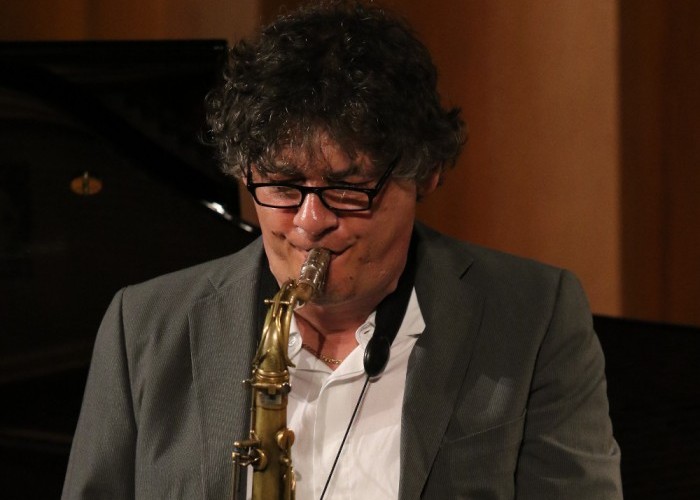Jan 13, 2026 2:09 PM
More Trump-Kennedy Center Cancellations
The fallout from the renaming of the John F. Kennedy Center for the Performing Arts to include President Donald…

You have a concert recording with George Cables, Darryl Hall and Victor Lewis from 2015?
We’ve done a lot of concerts together, many tours. I met George for the first time in 1987-’88, when he played in Italy with Cameron Brown and Giulio Capiozzo [1946-2000], a drummer from Italy who brought George to Italy many times. He was playing in Ferrara. I went to the concert with my saxophone, and I asked to play one song. The drummer was not really happy, but George told me, “Of course you can play one song with us.” George is a very kind person.
After I played, George told me, “Hey, complimenti, very good,” and told me, “We play in Modena after tomorrow; you can come to play some songs with us.” After that, I don’t see George for a long time. I went to New York in 2000 to play a gig with Ray Mantilla, who I also played a lot with. George was in the band, and we met again. After that, we decided to play together, and we’ve done it for many years.
Each master gives you a certain emotion. Cedar gave me incredible ideas; he came up with new phrases all the time. He moved the voice in the piano and inspired you all the time. He was the best comper I ever heard in my life. George gave me more soul music, black music ... . it’s hard to explain. I play a lot with Harold Mabern, too; he has a different energy, a different sound.
You try to find a way to play with each guy with your personality—but to find a personality is not so easy.
When do you think you found yours?
Cedar helped me a lot to find my way. I remember when I started to practice together with Steve Grossman, I tried to play like Steve—all the phrases. Sal Nistico came, I thought this was different, and I tried to play the phrases of Sal Nistico. But when I met Cedar, George, the big masters, I understood that I have to find my way. I can’t play in the life of another person. I have to play my life. Cedar helped me to put my emotions my life in my music. I think that really started to happen in 2000.
Is your family musical?
Yes, my father played trumpet, and my uncle played accordion—not professionally, but they loved the music.
When I was 5 or 6 or 7, my father got many records. He liked the big bands—Tommy Dorsey, Jimmy Dorsey, this kind of guy. I heard it in my house all the time. He liked trumpet players—he didn’t have Charlie Parker or John Coltrane records. He liked the old style. The first time I heard Charlie Parker, I was 14 or 15.
John Coltrane is another one of my great influences: his soul, his spirit.
Of course, the other one is Sonny Rollins. But I love Joe Henderson, too. Wayne Shorter.
Do you teach? What’s your philosophy of teaching jazz?
The first thing I try to teach is the sound. Many people like to play notes, but they don’t like to study the sound. Your personality is in the sound.
John Coltrane and Dexter Gordon can play the same phrase, but with a different sound. It changes it a lot. If you play a melody with a good sound and a good vibration—emotion—I can hear your melody. But if you have a bad sound, I can’t hear your melody. So, sound is first for me, and also the rhythm. I study rhythm a lot. I have the saxophone play a walking bassline for the rhythm and the swing.
After sound and rhythm, I teach technique and harmony—but first is sound. DB

Belá Fleck during an interview with Fredrika Whitfield on CNN.
Jan 13, 2026 2:09 PM
The fallout from the renaming of the John F. Kennedy Center for the Performing Arts to include President Donald…

Peplowski first came to prominence in legacy swing bands, including the final iteration of the Benny Goodman Orchestra, before beginning a solo career in the late 1980s.
Feb 3, 2026 12:10 AM
Ken Peplowski, a clarinetist and tenor saxophonist who straddled the worlds of traditional and modern jazz, died Feb. 2…

The success of Oregon’s first album, 1971’s Music Of Another Present Era, allowed Towner to establish a solo career.
Jan 19, 2026 5:02 PM
Ralph Towner, a guitarist and composer who blended multiple genres, including jazz — and throughout them all remained…

Rico’s Anti-Microbial Instrument Swab
Jan 19, 2026 2:48 PM
With this year’s NAMM Show right around the corner, we can look forward to plenty of new and innovative instruments…

Richie Beirach was particularly renowned for his approach to chromatic harmony, which he used to improvise reharmonizations of originals and standards.
Jan 27, 2026 11:19 AM
Richie Beirach, a pianist and composer who channeled a knowledge of modern classical music into his jazz practice,…